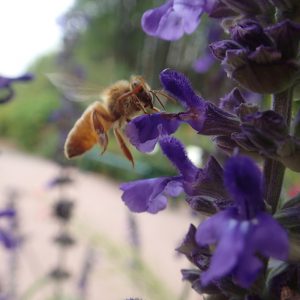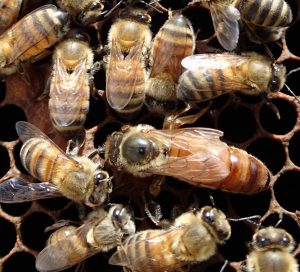The European honey bee

The European honey bee has been in the United States for a long time. Brought here in the early 1600s by, you guessed it, Europeans. The Honey bee may as well be considered native since they’ve been here as long as European settlers. Due to the honey bee’s nature of swarming and creating new colonies, they quickly established themselves in the wild. Beekeepers commonly retrieve wild hives and return them to boxes for the bees to work, and for the keepers to reap the benefits. It’s always nice to get free bees! With the work of beekeepers managing hives, the honey bee will hopefully be around to pollinate our crops and give us delicious honey, for a long time.
Is the honey bee in trouble?
Word is out that honey bees are in trouble. They are indeed under a barrage of threats that make being a honey bee much more challenging. But, they are not as threatened as many people may think. We all know the importance of honey bees to our food system and it may be for this reason that beekeeping has become quite popular with nearly five thousand registered beekeepers in Florida alone. The popularity of honey bees will hopefully assure a bright future for them. These many challenges have been taken over by a hearty group of pioneers, whom I like to call beekeepers. It is through their knowledge and persistence that the future of the honey bees may depend.
The new challenges

At one time the process of raising honey bees was generally a simple one but much like other agricultural ventures, outside forces have complicated things. In a world of globalization, insect pests and diseases move around the globe much too swiftly. A mite, Varroa destructor, showed up in the United States in the 70s and changed the way beekeepers tended their bees. Mites are not insects but are in the Arachnid family with spiders, ticks, and scorpions. Like small ticks, they feed on the bees while spreading viruses and weakening the whole hive. Understanding these challenges is a must for any new beekeeper.
Heartland Beekeepers Association
Becoming a beekeeper is not for everyone. But for those with enough interest to put on a bee suit, and work an open hive, they are often hooked. Once they begin to learn about honey bees, the fascination often outweighs any obstacles they come across. While it is definitely not for everyone, many people enjoy the challenge and almost everyone loves when they bottle that first batch of honey. In Highlands County, we are fortunate to have the Heartland Beekeepers Association. They meet monthly on the third Thursday at 7 pm at the Bert J Harris Agricultural Center’s conference room 2. They often have field days where you can put on a bee suit and really decide if beekeeping is for you. On September 10th, the Heartland Beekeepers Association with the assistance of Highland County Extension and the Master Gardener Volunteers will be offering an all-day course on beekeeping. The class is from 9 am until 4 pm and includes coffee, lunch, and snacks. If purchased in advance, the cost is $30. The cost will be $35 at the door. Click here to register or call the Extension office at (863) 402-6540 for more information.
Keep in Touch with UF/IFAS Extension, Highlands County
That’s what’s new from the Hometown Gardener. Like and Follow me on Facebook at Hometown Gardener.
Read my other blogs by clicking here.
Sign up for our Highlands County Master Gardener Volunteer, “Putting Down Root” Newsletter Here.
Join our Facebook groups Highlands County Master Gardeners, Central Florida Butterfly and Pollinator Club, Science-Based Florida Gardening Answers, and Heartland Beekeepers
Source: UF/IFAS Pest Alert



